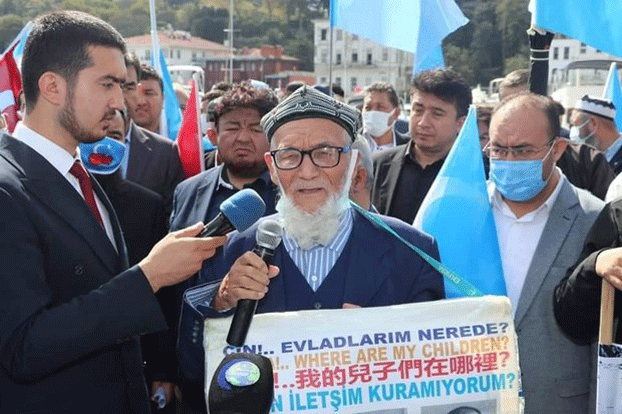Chinese authorities have destroyed a dome in a park that a Uyghur living in Turkey had built in his former hometown in Xinjiang to give locals an open-air place to quietly contemplate the Qur’an.
Mamattohti Imin says he paid U.S. $31,300 to construct the park in Lengger township, Toqquzaq county (in Chinese, Tuokezhake), in the troubled western region of China, where government authorities have pushed to wipe away Uyghur religious and cultural expression.
He told RFA that he wanted to give locals, including his children and grandchildren, a place to pray and as an outlet for his own grief over his separation from his homeland. The dome lay next to his burial plot in Buwihenim Cemetery in a park that he filled with flowers and fruit trees. He had also constructed several houses on the site.
“I heard that they tore it down,” he told RFA. Mamattohti used GPS maps to confirm that the dome had been torn down.
The Chinese government has embarked on a campaign to wipe out the religious and cultural heritage of the 12 million mostly Muslim Uyghurs who live in the Xinjiang Uyghur Autonomous Region.
Mamattohti, who has lived in Turkey for half a century, said he was told that 10 of his children and grandchildren, offspring from his first wife, had been taken into “re-education” camps or sentenced to jail. A Lengger township official contacted by RFA said seven of Mamattohti’s children and grandchildren remained in prison.
He has participated in demonstrations staged by Uyghurs in front of the Chinese Embassy in Istanbul, demanding news of missing family members in Xinjiang.
“Because I’m here [in Turkey], they said I’m a terrorist, a separatist,” he said. “They said I tried to split up the homeland, that I’d gone on radio and television, that I’d shared news with the radio. They said a lot of nonsensical things.”
A police officer who works in Lengger’s No. 2 village told RFA that police had no part in destroying the dome built by Mamattohti.
“The police don’t have any knowledge of how it happened,” she said.
The village chief, who did not give his name, said he was in the park on the rainy day that the dome was demolished and that local police were not involved.
“There was a meeting where they said that the dome was going to be torn down,” he told RFA. “It came from township government. The next day, we didn’t go into the office, and instead we went to the dome to destroy it.”
The workers disassembled the highest part of the dome, took away the wood, and cleaned the area, he added.
Hajim’s Garden
Mamattohti’s ancestors are buried in Lengger township, and the five children he had with his first wife were born and raised there.
Although he left the area, he said he still felt an obligation to the community. He previously had built an elementary school in Lengger.
His park sat on 150 mou of land (25 acres) near the slope of a mountain. In 2009, Mamattohti paid to establish the garden with flowers and fruit trees and the dome, which had four open sides.
“It was on the banks of a river, just about 10 to 20 meters (33-66 feet) away, so we would go get water and bring it back in pots and buckets. My children and grandchildren would help.”
Next to the dome, Mamattohti had a burial plot built for himself, a representation of his dream to take his final breaths in his homeland.
“After I found success with [the garden], it became the kind of place people wanted to come and sit. People would say they wanted to go and sit in Hajim’s Garden,” he said, using an honorific for Muslims who have completed the hajj, a pilgrimage to the sacred city of Mecca in Saudi Arabia.
In 2017, sensing that his health was worsening, Mamattohti visited his homeland expecting that he would stay there until he died. But he encountered conditions unlike any he had experienced in the past.
Local authorities who previously praised him for his financial investments in the township now put him under house arrest, forbidding him to leave the courtyard of his house. He was eventually forced to leave Kashgar (Kashi) prefecture, where he had gone back to live his final days.
Mamattohti has tried to return to Kashgar several times over the past four years so he could divvy up his assets among his children, but the Chinese Embassy denied his visa requests.

